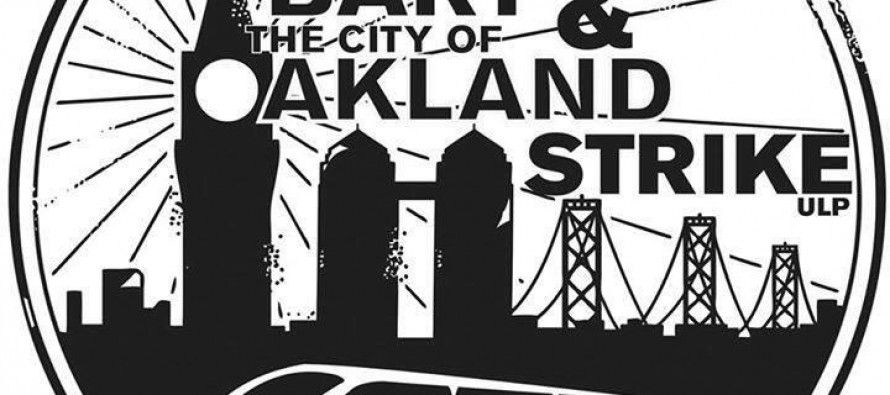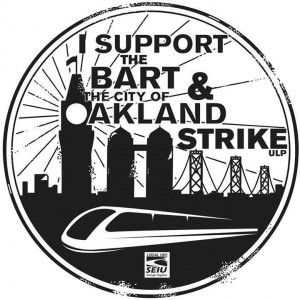Transit strike ban fails in committee

 California’s Bay Area suffers the third worst traffic congestion in the nation, behind Honolulu and Los Angeles, according to USA Today. That congestion occurs despite Bay Area Rapid Transit‘s 104 miles of track taking nearly 400,000 people off of the roads each weekday.
California’s Bay Area suffers the third worst traffic congestion in the nation, behind Honolulu and Los Angeles, according to USA Today. That congestion occurs despite Bay Area Rapid Transit‘s 104 miles of track taking nearly 400,000 people off of the roads each weekday.
So when the BART unions went on strike twice last year, the Bay Area’s normally bad congestion turned into a gridlock nightmare.
“Freeways have choked to a standstill,” reported the AP on July 2, two days into the first strike. “Lines for ferry service tripled, and boats were crammed to standing-room only. Buses were stuffed with riders who felt fortunate to be on board as many commuters were literally left in the dust when buses zoomed by without as much as a honk or an explanation.”
$73 million hit
Commutes that normally took a half hour became two-hour slogs. Many workers arrived late and/or left early or just stayed home altogether. As a result, each day of the strike cost the Bay Area at least $73 million in lost worker productivity, according to a Bay Area Council Economic Institute estimate.
“The Bay Area economy is suffering, along with hundreds of thousands of commuters,” said Jim Wunderman, Bay Area Council president/CEO in a July 2 statement.
That suffering has translated into strong opposition to allowing BART strikes, according to an Aug. 2 BAC poll. Seventy percent oppose allowing BART strikes, including 62 percent of Democrats and 60 percent of those who belong to a union or have a family member in a union.
Steve Glazer, a candidate for Joan Buchanan’s termed-out 16th Assembly District seat, capitalized on the angst. He spent weeks at BART stations throughout the Bay Area collecting thousands of signatures on anti-strike petitions.
“A strike will cripple our economy, hurt workers getting to their jobs, and limit access to schools and health care facilities. This is wrong,” Glazer said in a Sept. 20 statement. “I support state legislation to prohibit public transportation workers from striking. Strike bans exist in other states. Transit systems in New York, Massachusetts, Chicago and Washington have restrictions against strikes.
“The impact of a strike against a regional transit system like BART will be felt across the state. This is not an issue that should be in the hands of individual transit boards. We need a statewide law prohibiting transportation strikes.”
Union threats
While Glazer was a hero to many beleaguered commuters, the Democrat said he has become a lightning rod for union hatred.
“They have made it clear to me that I’ll never be elected to any public office ever again in my life,” Glazer told KGO radio. “One union leader came up to me within hours after I announced my petition effort and said, ‘You put nails in your coffin.’
“So they’ve made it clear that I’ve made a huge miscalculation, that they don’t want to talk about the merits. They’ve made clear that it’s personal, and it’s political, and will affect anything that I choose to do in the future.”
Perhaps not surprisingly, there has been little, if any, backing for Glazer from other Bay Area politicians.
But Sen. Mark DeSaulnier, D-Concord, said in an Oct. 23 statement marking the end of the second strike that something needs to be done to fix the system:
“This strike was devastating for commuters throughout the Bay Area, and could not go on any longer. The current system failed the Bay Area. The commuters faced nightly uncertainty, and daily congestion, as this contract dispute continued. This must not happen again. I have gone through at least five BART contract negotiations in my time as an elected official from the Bay Area – clearly the process is not working. We owe it to the commuters to fix this.”
DeSaulnier chairs the Senate Transportation and Housing Committee, which he said was “investigating how other metropolitan areas around the nation avoid this kind of situation. After conducting the investigation, the committee will pursue every possible remedy to ensure this never happens again. We will continue to work with affected stakeholders to find lasting solutions.”
Bill would ban transit strikes
While DeSaulnier’s committee continues its investigation, Senate Republican Leader Bob Huff of Diamond Bar pushed ahead recently with Senate Bill 423. In addition to prohibiting public transportation workers from striking, his bill would have:
- Repealed statutes governing public transportation labor disputes, including requirements governing labor relations when a strike is threatened.
- Proscribed penalties and sanctions for employees and unions that participate in, cause, encourage or condone strikes.
“It’s hard to think of a reason why an entire region should have to endure this kind of mass shut down,” Huff told the Senate Public Employment and Retirement Committee on Jan. 13. “Many public services are considered essential: police officers and firefighters, for example. Strikes are prohibited for this very reason. They are critical for the public on a day-to-day basis. The reliability of public transit should be no different.
“California has 1.3 billion transit trips per year governed by some 400 transit authorities. The reliability of these public transportation resources should be and must be protected. SB423 will protect transit riders and ensure these services are reliable by prohibiting union leaders from striking. The recent BART strike demonstrates how important public transit is in California. And if we are going to rely on mass transit, then we need to make mass transit reliable.”
Huff added that his bill is based on similar strike-ban legislation in New York.
“Other states have recognized how important this is,” he said. “Even in the Bay Area, a beacon of liberal politics, upwards of 70 percent support a ban on transit strikes.”
But none of those 70 percent made it to the hearing. Huff brought no witnesses, and no one else spoke in favor of SB423.
Unions defend right to strike
Labor unions, however, showed up in strong numbers to argue against the bill, which they see as an assault on their collective bargaining rights.
“What the bill fails to recognize is that the collective bargaining process is very intricate,” said Michael Bolden, representing the Service Employees International Union. “It’s supposed to have a lot of give and take on both sides. What it also does not recognize is the history or underlying rationale of why a strike may be considered by a bargaining unit. It also fails to recognize what a labor union will consider prior to even calling a strike.
“What the bill is is extremely punitive. It confers rights upon an employer while essentially turning a blind eye to what an employer could or could not be doing during the process of collective bargaining. We firmly believe that, if this right is going to be taken away, it should be bargained away at the collective bargaining table. It shouldn’t be legislated.”
Kaitlin Vega, legislative advocate for the California Labor Federation, argued that Californians’ quality of life would be reduced if the ability to strike was taken away.
“California today faces the greatest level of inequality that we have ever seen,” she said. “In our view that is largely due to the diminished ability of workers to come together to engage in collective bargaining up to the point of withholding labor, which is always the last resort. But these collective bargaining rights have been essential to workers improving conditions, and really to the building of the middle class.
“And today we see such historic wage inequality. It makes it hard to understand why there would be further proposals to strip workers of their rights to collective bargaining. Especially because this bill would retain the ability of an employer to impose a contract, to lock workers out, to replace workers who go on strike. The employer would be left with all of their weapons at their disposal. And yet the workers would have no recourse. And that to us just seems fundamentally unfair and wrong.”
AFSCME: Ability to strike helped build America
Willie Pelote, representing the American Federation of State, County and Municipal Employees, argued that nothing less than America’s future is at stake.
“Collective bargaining was a process that helped us build America,” he said. “And when you’re doing something like building America, you have differences of opinion from time to time. And then to come to the Legislature and ask to take away those taxpayers’ right to have those differences of opinion from an organization that was sitting on over a billion dollars. And then to hammer their workers into the ground, and ask them as citizens that live and reside in those communities and raise a family to take less while they are sitting on a reserve of over a billion dollars.
“And then to come here and ask you to give them the right to do that even more. It’s unconscionable. We are in opposition to this bill. It’s wrongheaded and headed in the wrong direction. We want to continue to build America. And it’s about time to let us go back and do that. Because that’s what we do best, build America.”
Committee chairman Sen. Jim Beall, D-San Jose, acknowledged that something needs to be done to break the cycle of strikes and strike threats. But he argued against Huff’s bill, calling it an “extreme, kind of far-end way of dealing with it. I think it’s a complicated issue. We have a lot of local governments with, for example, binding arbitration for their police and fire. I think there can be more discussion how we can maybe mediate or resolve strikes in a more favorable way than the BART situation.”
The three committee Democrats then killed SB423 with a 3-2 vote against it.
Democrat hardball
Huff issued a statement after the bill’s defeat, blaming it on political hardball by Democrats:
“Perhaps this bill should have been heard first in the Senate Transportation Committee, since it’s all about making sure our transit systems actually work for the public. But instead it was sent to the committee that focuses on the concerns of public workers. That should tell you something about the priorities of the majority party.”
Vowing to continue pursuing “the idea of protecting residents against crippling public transit strikes,” Huff added that other legislators have indicated they will introduce similar proposals in the coming months.
Related Articles
East Bay second Cal State foundation to file questionable tax returns
May 21, 2012 By John Hrabe With 427,000 students and 44,000 staff on 23 campuses, the California State University System
Prop. 26 wins San Diego water war
Remember Proposition 26, the Stop Hidden Taxes Initiative, passed by 52.5 percent of California’s voters in 2010? Probably no one
Federal Reserve warns, Calif., other municipal bonds very risky
Aug. 20, 2012 By Chriss Street Last week, we first reported first that “Permanent Link to Calif. sales tax revenue



